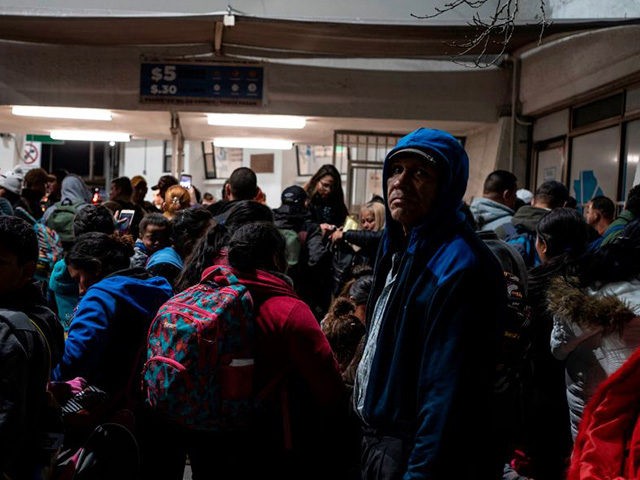Two GOP Senators from opposite ends of the GOP political spectrum are urging President Joe Biden and his staff to preserve the job-protecting, life-protecting “Remain in Mexico” program.
Biden is expected to sign an executive order, likely on Tuesday, that ends the negotiated program with Mexico. The program was designed to deter economic migrants and their families by denying them entry to U.S. jobs until they win their U.S .court claims for asylum.
If the program is ended and the border is reopened to job-seeking migrants, more poor migrants will enter the federal de-facto “Hunger Games” international obstacle course. That obstacle course lets winners get jobs in the United States — if they survive the trek.
The program, which is also titled the Migrant Protection Protocols, slashed the cross-border flow from 140,000 in May 2019 to 17,000 in April 2020. That huge success has enraged migration advocates, who are now pleased that Biden is expected to end the program and accept the entry of at least 20,000 migrants waiting in Mexico.
“Joe Biden is putting Americans last,” responded Sen. Tom Cotton (R-AR), who has repeatedly opposed labor migration into Americans’ jobs:
Sen. Lindsey Graham (R-SC) is widely expected to cut a deal with Democrats to offer citizenship to two million-plus migrants brought here as children. His tweet said that ending the program would be “catastrophic,” partly because it would wreck chances for an amnesty deal:
Graham has begun amnesty talks with Sen. Dick Durbin (D-IL). Durbin’s expert staff will insist on inserting hard-to-understand jargon into the amnesty bill that is intended to gut open Americans’ national labor market to a huge inflow of blue-collar and white-collar migrants, a legislative expert told Breitbart News.
Most of the GOP caucus, however, is dodging the issue, despite the threat of cheap labor to their voters’ jobs and livelihoods.
The cruelty caused by the United States government’s willingness to accept migrants via the obstacle course was spotlighted on January 30 by the Los Angeles Times.
The newspaper reported the death of several teenagers who entered the Hunger Games obstacle course, including 15-year-old Robelson Isidro, from Guatemala. Under a 2008 law protected by progressives and immigration lawyers, the teenagers would be defined as ‘Unaccompanied Alien Children” and be allowed to join the growing population of child laborers in U.S. jobs. But the teens were reportedly killed by some of the cartel gunmen who sell access to the border, and the teens’ bodies were left in a burned-out pickup truck:
But Robelson’s mother and other families from Comitancillo say they are sure that 13 of the dead are their children. On Monday, the families trekked six hours to Guatemala’s capital to provide DNA samples at the nation’s foreign ministry, which were sent to Mexican authorities.
…
The community has a long history of sending migrants to the United States, and he had uncles who lived there. They had indoor kitchens. They didn’t have to cook outside under a tarp.
“He was ashamed,” his mother said in a phone interview. She said he told her: “I’m going to fight to make my dreams come true. I have to get my siblings ahead in life. I’m going to get them out of poverty.” His uncles [in the United States] wired him money to make the journey north.
The article is headlined, “13 young Guatemalans who left for a better future were slain in Mexico, families say.”
The weak border has created a conveyor belt of migrants. It starts when migrants get into the United States and then send money back to their villages and neighborhoods. The inflow of dollars humiliates locals who rely on local wages and so it goads them to begin the lawless, deadly Hunger Games trek through loans, coyotes, cartels, rape, children, deserts, weather, border laws, barriers, rescuers, cheerleading progressives, sympathetic reporters, transport, judges, and cheap-labor employers.
Progressives, however, blame Americans‘ border controls for the migrants’ deaths because the Americans want to preserve decent wages and affordable housing for themselves, their children, and their communities.
For years, a wide variety of pollsters have shown Americans’ deep and broad opposition to labor migration — or the hiring of temporary contract workers into the jobs sought by young U.S. graduates. The multiracial, cross-sex, non-racist, class-based, priority-driven, and solidarity-themed opposition to labor migration coexists with generally favorable personal feelings toward legal immigrants and toward immigration in theory.
The deep public opposition is built on the widespread recognition that migration moves money from employees to employers, from families to investors, from young to old, from children to their parents, from homebuyers to real estate investors, and from the central states to the coastal states.

COMMENTS
Please let us know if you're having issues with commenting.